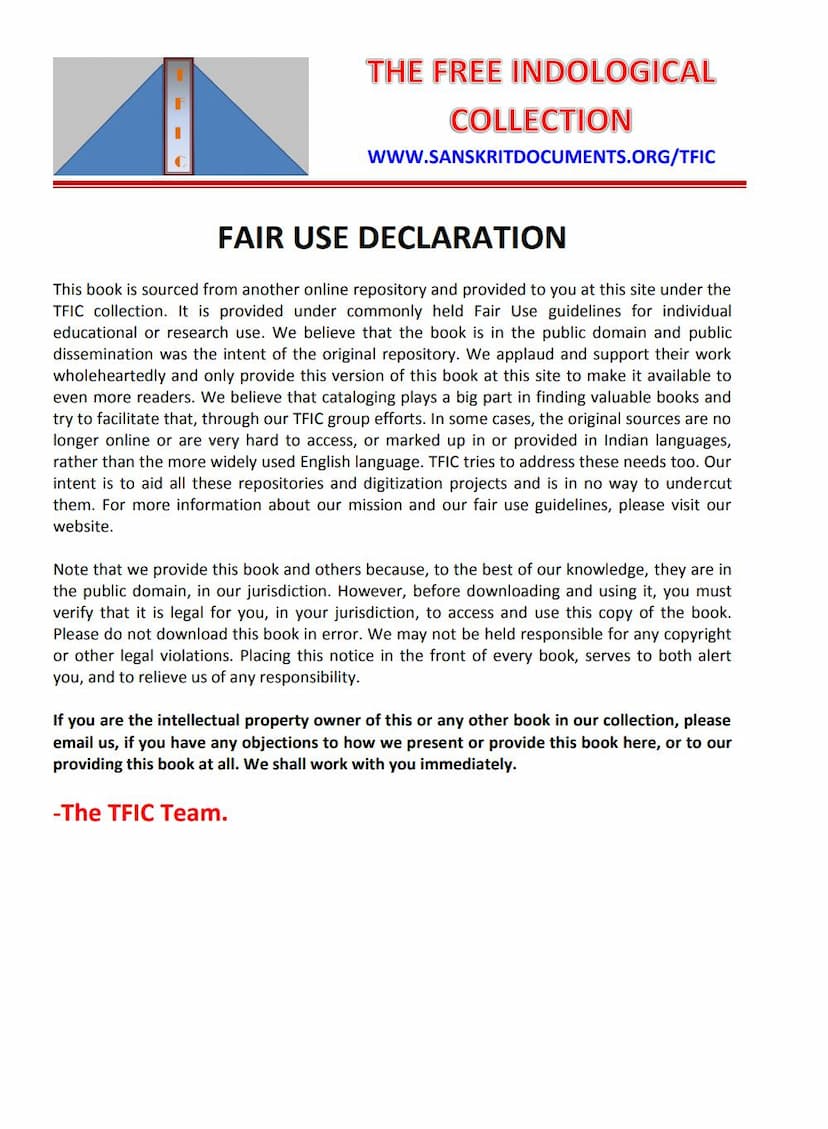Jain Tattvagyan Mimansa
Added to library: September 2, 2025

Summary
Here's a comprehensive summary of the Jain text "Jain Tattvagyan Mimansa" by Darbarilal Kothiya, based on the provided pages:
Book Title: Jain Tattvagyan Mimansa (Investigation into Jain Metaphysics/Philosophy) Author: Dr. Darbarilal Kothiya Publisher: Veer Seva Mandir Trust, Varanasi Overview:
This book, published by Veer Seva Mandir Trust in 1983, is a collection of scholarly essays by Dr. Darbarilal Kothiya, a renowned Jain scholar. It delves into various aspects of Jain philosophy, history, and literature. The work is structured into three main sections: Dharma (Religion), Darshan (Philosophy) and Nyaya (Logic/Dialectics); Itihas (History) and Sahitya (Literature); and Vividh (Miscellaneous). The essays are primarily based on Dr. Kothiya's research articles published in journals like 'Anekant' and presented at various academic seminars and conferences.
Key Themes and Content:
The book offers in-depth and research-based discussions on numerous topics related to Jainism. It aims to shed new light on various authors, their works, and historical uncertainties, making it a valuable reference for scholars and students alike.
Structure of the Book:
The book is divided into three main sections:
-
Volume 1: Dharma, Darshan and Nyaya (Religion, Philosophy, and Logic):
- This section comprises 27 essays focusing on core Jain principles.
- Topics covered include:
- The philosophical perspective on merit (Punya) and sin (Papa).
- The meaning of 'Vartana' (a concept related to the nature of substances).
- The significance of self-restraint (Sanyam) and righteous conduct (Charitra) in life.
- Compassion (Karuna) as a virtuous state.
- Jain Dharma and initiation (Diksha).
- A contemplation on 'Dharma' itself.
- The 'Amudha-drishti' (unwavering right faith) aspect of Samyak-svapariksha (correct view) as a crucial testing principle.
- The teachings of Lord Mahavir, the importance of the Vir Shaasan (Jain religious order), his spiritual path, and his ethics of compassion and non-violence.
- Detailed discussions on 'Anekantavada' (non-absolutism) and 'Syadvada' (conditional predication).
- The concept of 'Samyad Velathiputta' and Syadvada.
- The acceptability of the synthesizing perspective of Jain philosophy.
- The contribution of Shraman (Jain/Buddhist) culture to Vedic culture.
- An important discussion on 'Anekanta' during a meeting with Dr. Ambedkar.
- An analysis of 'Sullekhana' (voluntary fasting unto death) in Jainism.
- The concept of Omniscience (Sarvajnatva) in Jainism.
- Contemplation on 'Arthadhigama' (understanding of meaning/purpose).
- Discussions on 'Sanjad' (a term related to the soul's state) and its presence in a Sutra.
- Contemplation on the 53rd verse of 'Niyamsara' and its interpretation.
- Essays on research methodology: the necessity of objectivity and important Q&A on research.
- Biographical sketches of prominent figures like Kundakunda, Gridhapichchha (Kunda Kunda), Samantabhadra, Vadisingh, Nemichandra Siddhantideva, and Acharya Shantisagar.
-
Volume 2: History and Literature:
- This section contains 11 essays on historical and literary topics.
- Key subjects include:
- Syadvada Siddhi and Vadisingha.
- 'Dravya Sangraha' and Nemichandra Siddhantideva.
- 'Shaasan Chatustrishika' and Madankirti.
- The significant opinion of Acharya Akalanka concerning the term 'Sanjad'.
- The presence of 'Sanjad' in the 93rd Sutra.
- Analysis of the 53rd verse of 'Niyamsara', its interpretation, and meaning.
- Discussions on research methodology, including freedom from bias and important Q&A.
- Identifying Gunachandra Muni.
- Identifying the correct Kundalgiri pilgrimage site.
- An ancient mention of the Gajpath pilgrimage site.
- Biographies of key Acharyas like Kundakunda, Gridhapichchha, and Samantabhadra.
-
Volume 3: Miscellaneous:
- This section covers various other topics, including:
- The great contribution of Bihar, Tirthankara Mahavir, and Indrabhuti.
- The role of scholars in society.
- The cultural significance of Ahara (a Jain pilgrimage site).
- Historical accounts of Acharya Shantisagarji's Mahasamadhi-marana (peaceful death).
- An introduction to the ideal ascetic Acharya Namisagar.
- Memories of the venerable Muni Ji.
- A tribute to the talented Pandit Todarmal.
- The festival of 'Shrut Panchami'.
- 'Jambujinastakam' (a Sanskrit hymn).
- The festivals of Dashalakshan Dharma, Kshama Vani, Vir Nirvana Parva (Deepavali), and Mahavir Jayanti.
- Detailed descriptions of pilgrimage sites like Papura Ji, Pavapur, and Shravanabelgola, including the Mahamastakabhisheka.
- Travelogues on visits to Rajgir and Kashmir.
- An account of a stay in Mumbai.
- This section covers various other topics, including:
Key Contributions and Significance:
- Scholarly Rigor: The book is noted for its deep research, analytical approach, and original insights into Jain philosophy, history, and literature.
- Clarification of Uncertainties: It addresses and resolves historical uncertainties regarding the timelines of scholars and the authorship of certain texts, such as the 'Ratnakarandashravakachara'.
- Dissemination of Knowledge: By compiling numerous research articles and essays, the book makes complex Jain concepts accessible to a wider audience, including students and researchers.
- Interdisciplinary Approach: It touches upon various disciplines like religion, philosophy, logic, history, archaeology, and literature, offering a comprehensive understanding of Jain studies.
- Biographical Insights: The inclusion of biographical information on prominent Jain Acharyas provides valuable context for their philosophical contributions.
- Emphasis on Research: Dr. Kothiya's work highlights the importance of objectivity and thorough research in understanding Jain principles, as seen in his essays on research methodology.
Overall Impression:
"Jain Tattvagyan Mimansa" is a significant contribution to Jainological studies. It reflects Dr. Darbarilal Kothiya's extensive scholarship and his dedication to making the profound teachings of Jainism accessible through rigorous research and clear exposition. The book serves as an essential resource for anyone seeking to understand the intricacies of Jain philosophy, history, and its rich literary heritage.